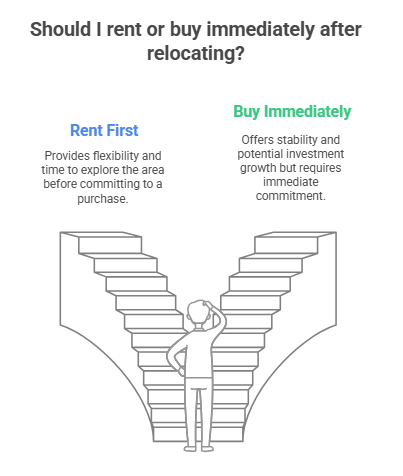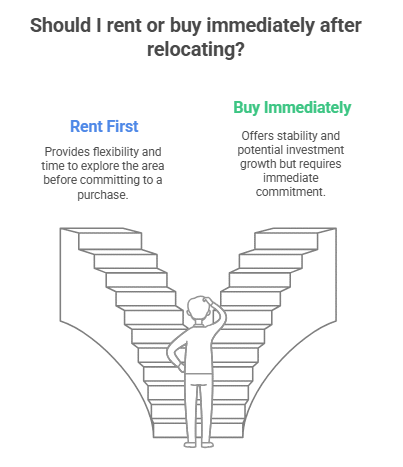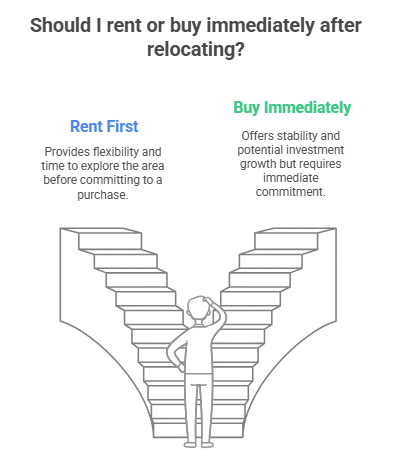How to Navigate Job Relocation and Real Estate Without Losing Your Mind (or Money)

A job relocation sounds exciting. Maybe it’s a promotion, a better opportunity, or a long-overdue fresh start. But the moment the offer letter lands, so do the questions:
Where will I live? Should I buy or rent? How fast can I move? What happens to my current home?
Relocating for work doesn’t stop after packing boxes. You will have to make big decisions fast, especially when real estate’s involved.
Whether you’re moving across Texas or cross-country, navigating the housing side of job relocation requires more than just a moving checklist. It requires strategy, timing, and clarity.
Let’s break it down step by step.
Step One: Know the Timeline, And What It Actually Means
Your company says you’re relocating in 60 days. That sounds like two months, but in real estate terms? It’s not much time.
Once you know the relocation is real, the first thing to do is reverse-engineer your move:
- When do you need to report to the new office?
- Will your company cover temporary housing?
- Do you need to sell a home before buying again?
The clearer you are on timing, the smoother every other decision becomes.
Even if you’re not sure whether to buy or rent yet, reach out to a local real estate expert in your destination city. In Houston, for instance, we at KV Properties often help relocating professionals map out move-in timelines, neighborhood pros/cons, and even short-term rental options, long before the moving truck is booked.
Step Two: Should You Rent First or Buy Immediately?

This is the biggest question most relocating buyers ask, and there’s no one-size-fits-all answer. But here’s what to consider:
Renting first can make sense if:
- You’ve never lived in the new city
- You’re unfamiliar with commute patterns or school zones
- The market is hot, and you don’t want to rush into a long-term purchase
Buying immediately might be smarter if:
- You already know the area well
- You’re looking to build equity right away
- You have a relocation package with housing benefits
Your decision will revolve around comfort, timing, and whether you’re walking into a known or unknown situation.
Step Three: Research Neighborhoods Through a Relocation Lens
Relocating changes how you evaluate neighborhoods.
In your current city, you might know the good school districts, the flood zones, or which grocery stores stay open late. In a new place? You’re starting from scratch.
Look beyond aesthetics and focus on day-to-day life:
- How long is the commute to your new office?
- What’s traffic like during rush hour?
- Are schools and hospitals close by?
- Is this area expected to grow, or is it already saturated?
Use tools like Google Street View, school district maps, and local forums. But nothing beats having a real estate agent who actually lives there and can guide you through the local rhythm.
Step Four: Don’t Underestimate the Emotional Side of Moving
Yes, the logistics matter, but don’t ignore the emotional weight.
Leaving a familiar neighborhood, selling a home you love, and starting fresh can feel overwhelming, even if the opportunity is exciting. And if you’re moving with family, their transition matters too.
Set realistic expectations. There may be moments of regret or doubt, but that’s normal. What helps is feeling confident in the decisions you’re making: the dream home, the location, the timeline.
Working with someone who’s been through relocation stories again and again (like us at KV Properties) can ground the experience. You don’t need to navigate it alone. We are there to offer help!
Step Five: Consider the Financials Beyond the Offer Letter
Relocation often comes with perks: moving stipends, temporary housing, maybe even a relocation bonus. But don’t let that mask the real numbers.
If you’re selling a home, factor in closing costs, market recaps, and how long homes are taking to sell in your area. If you’re buying, understand what homes cost in your destination city today, not based on last year’s market.
Also consider:
- Will your cost of living go up or down?
- Will you qualify for a mortgage based on your new salary?
- Do you need bridge financing between selling and buying?
Every dollar counts when you’re moving across state lines with real estate in the mix.
Final Thoughts
Relocating for a job is far more than switching cities; it’s about resetting your whole lifestyle. From choosing where you’ll live to understanding how the local market works, every step affects your peace of mind and your financial future.
At KV Properties, we’ve helped countless professionals transition smoothly into Houston’s real estate market. Whether you’re moving here from Dallas, San Francisco, or overseas, our team is built to support relocation buyers from start to close, including everything in between.
So, if your career is on the move, let’s make sure your home life moves with it, confidently, clearly, and on your terms. Contact us today!
Frequently Asked Questions
1. Should I buy a home before moving or wait until after?
If you’re unfamiliar with the area, waiting can give you more confidence and help avoid rushed decisions.
2. Can I buy a home in a new city without seeing it in person?
Yes. Many buyers use virtual tours, agent walkthroughs, and remote closings to buy from afar.
3. Will my relocation package cover home-buying costs?
Some do, it depends on your employer. Ask if they cover agent fees, temporary housing, or closing costs.
4. What if I need to sell my current home quickly?
Talk to an agent ASAP. You may explore pricing strategies or partner with a buy-before-you-sell program.
5. How do I choose the right neighborhood in a new city?
Work with a local agent who understands your lifestyle needs, commute, schools, community, and resale potential.
6. How far in advance should I start the relocation process?
Ideally, 60–90 days before your move. This gives you time to explore, plan, and secure housing without pressure.

Karishma Naidu Vohra is a dedicated real estate agent renowned for her entrepreneurial spirit and commitment to excellence. After developing her skills in Los Angeles, she found her true passion in Houston, where she specializes in buying, renting, and selling properties.






